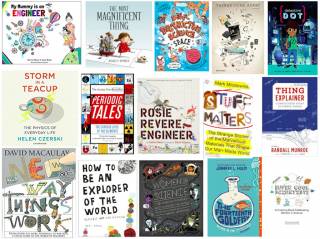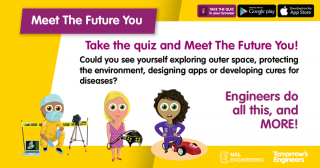Strategic Priorities
Rethinking our outreach and engagement programmes
Over the past three years, we at UCL Engineering have rethought our engineering engagement strategy. We have redesigned activities and developed new programmes. We recognised that change was needed, change in the systems, settings and processes currently in place. Our strategic priorities were developed with this in mind, creating and inclusive and positive environment for all, enabling, inspiring and making young people feel a sense of belonging in engineering, making positive memories when learning about STEM and allowing them to consider a STEM career as for them. We aimed to demystify engineering, to enable young people to defy stereotypical views of who can be an engineer and what engineers do. We develop their problem-solving skills, knowledge, resilience, sense of autonomy, sense of belonging and self-confidence. We find that pupils working on real-world challenges - with young engineers from similar backgrounds to their own - can change their preconceptions of who can be included in engineering. As a result, young people with many race, gender, ability and socio-economic backgrounds feel our programmes are for them, and a much wider young audience is learning about the significance of engineering to society.
At the core of our 50:50 Engineering Engagement Strategy is the aim to strengthen and diversify the engineering workforce, by encouraging young people from a wide range of backgrounds - especially young girls - to consider career pathways both ‘in’ and ‘from’ engineering. Requiring 50% participation of girls across all our engagement programmes was never just about getting a 50:50 gender balance. It was - and still is - about sending a strong message in the classroom, at home and to society about breaking down stereotypical messages that have created invisible barriers affecting young people’s confidence and career choices.
Designing activities based in engineering’s real social, ethical, environmental and humanitarian contexts is central to the strategy. We want students to appreciate the interdisciplinary nature of engineering. We focus on inclusivity, both for the course design and pupil participation, and promote diversity in every sense. Through the 50:50 Strategy, we have been able to create a step change in the representation of female students and students from ethnic minorities on our STEM Engagement programmes. The strategy has been implemented across our 134 STEM programmes, events and activities, connecting over 6,000 children and young people and 529 schools across the UK with 623 UCL Engineering staff and students who design and deliver the activities.
Our programmes focus on sustained, meaningful engagement. This, for us, means experimental engineering where pupils get to experience first-hand how engineers approach complex, real-world problems. We focus on building pupil’s engineering experiences over a period of time and working with their key influencers through targeted interventions. We have developed interventions across the entire primary and secondary education, ensuring that girls and boys as young as 4 years old receive an equal opportunity to experience engineering.
This insistence on diversity extends beyond pupil participants to include UCL Engineering staff and students delivering the activities. This has had significant impact. The direct and active involvement in the design and delivery of the engagement programmes has supported the grassroots formation of informal networks between our students and staff. These networks help them to share ideas and information, seeking support and advice from each other. These informal networks occur both within departments and across the faculty. It is this hidden impact that has strengthened the links connecting experiences, expertise and research areas amongst our engineering staff and students.
Our engagement with young people and schools seeks to create an ethos where engineering is seen as intrinsically worthwhile and relevant to pupils from all backgrounds, promotes diversity and gender equality, and - above all - is inclusive. It aims to provide academic rigour, practical invention and authentic engineering experiences for pupils as well as professional support for teachers, youth workers and local communities that help the pupils learn about STEM subjects, careers and degrees. UCL Engineering engagement is about sharing and enabling young people to understand what it is that engineers do, and why they do it. We want to encourage young people to study engineering, choose engineering as a career and achieve a better understanding of the important role of engineers in society. Our strategy is about inviting young people to discover the creative, problem-solving and humanitarian nature of engineering and its significance to society, while removing gender, racial and socio-economic barriers to these opportunities. The future relies on the next generation. Engaging young people with engineering can achieve far-reaching impacts and improve STEM literacy in the long term.
The six priorities of the 50:50 UCL Engineering Engagement Strategy
The 50:50 UCL Engineering Engagement Strategy focuses on six key priorities:
- Promoting INCLUSIVENESS and EQUALITY
We are committed to the design, development and provision of engineering engagement programmes for all children and young people, based on an inclusive, innovative strategy. Our programmes are inclusive both in pupil participation and in the programme design, taking an intersectional approach on diversity and inclusion.
In order to reach as wide and diverse a young audience as possible, our approach considers the diversity of young people and caters for a broad range of abilities and levels of understanding to ensure inclusiveness, equality, and access. In this way, we have achieved wider diversity and inclusion of groups who would otherwise be excluded from engineering, due to invisible social structures. This process includes: investment in tailored capacity building activities, raising awareness of our programmes through multiple and diverse channels and an innovative applicant selection process. As a result, young people of varied race, gender and socio-economic backgrounds feel these activities are ‘for them’. Most importantly, the approach instils a sense of belonging in engineering, which is the fundamental basis for our activities.
- Learning through EXPERIMENTAL ENGINEERING
We design engineering engagement programmes that encourage, enable and empower young people to actively participate in authentic, open-ended engineering projects through an experimental engineering approach.
We design activities based on cutting-edge research occurring in our labs with a strong social context and environmental mission. We focus on activities that promote a love of learning, encouraging young people to engage with the design-and-make process, problem-solve, and give voice to both their creativity and critical thinking. We want to encourage experimentation and provide substance and meaning to theoretical, abstract concepts, while developing young people’s knowledge and self-confidence. To achieve this, pupils are presented with open-ended, real-life and practical engineering challenges. We encourage imagination, gradually increasing the level of difficulty and enabling exploration and freedom in design decision-making, within a learning-by-doing framework. Pupils are able to design, touch, view, feel, inspect, pull apart, test and bring their own ideas to life, exploring the world around them within specific tasks and scenarios. They learn a set of skills which are put to the test throughout the programme, making challenges more tangible, and enabling them to see how real-world engineering is applied, while also contributing to the process.
- Inspiring through RELATABLE ENGINEERING ROLE MODELS
We understand the importance of strong role models in the form of young engineers from different gender, race and ethnicity backgrounds. We believe our UCL Engineering students are the best ambassadors to inspire young people about engineering.
We continue to grow our cohort of STEM Ambassadors and student volunteers that support our engineering engagement activities. We recognize the desire of many of our students to “make a difference”, and actively encourage our students to volunteer their time with children and young people. We aim to increase the science and engineering capital of young people. We have created strong role models through the representation of women and ethnic minorities at all levels from primary through to secondary education. This process has been made possible primarily by the passion, enthusiasm and commitment of our UCL students. They share their own experiences and differing personal pathways into engineering. Acting as mentors encourages our students to think about what inspired them into engineering, and how they might instigate the same passion in a younger person. Thus, in addition to a network of social contacts their own age with an interest in engineering, young pupils start establishing contacts with real engineers. They meet people like themselves and learn from role models they can relate to.
- Discovering STEM CAREER pathways
We aim to create activities and programmes that encourage young people to consider STEM career pathways and degrees. We want them to achieve a deep understanding of what an engineer actually does, and to question why and what it takes to become an engineer.
We encourage students to consider STEM career pathways as desirable, and to apply for STEM qualifications and careers by opening their eyes to the diversity of STEM learning and career pathways. We want to change the stereotyped perceptions of suitable choices and careers for young people, their teachers and parents, by raising awareness of the exciting and wide-ranging careers in engineering. We work towards defying stereotypes and empowering women and girls, by building their confidence and resilience. Our primary aim is to create a considerable positive shift in pupils’ understanding of what it is that engineers actually do, what it takes to become an engineer, and to motivate them to pursue careers and degrees in STEM.
- Prioritising EARLY INTERVENTION
We believe that early intervention is key if we are to challenge stereotypes holding back young girls and boys from achieving their full potential. Action needs to start at primary education.
Our UCL Engineering students introduce children as young as 4 years old to the world of engineering, through reading together about budding engineers’ amazing adventures. We have collected an extensive library of children’s engineering literature, and pupils are supported to further develop their literacy and numeracy skills through the Budding Engineers Reading Club programme. It presents a unique opportunity for pupils to learn and work with real engineers through continuous and on-going interaction.
- Supporting teachers through PROFESSIONAL DEVELOPMENT
We believe that empowering teachers through high quality continued professional development opportunities as well as supporting them in the classroom with curriculum-based resources and trained engineering tutors is a key priority. We believe that high quality education of children and young people depends on the excellence of teachers and the learning they encourage. We will work with teachers, teacher coordinators and STEM providers across the UK to offer bespoke, tailored training courses and resources, not just for teachers in schools but also for youth workers, individuals with relevant roles in libraries, local communities and museums. We aim to support teachers to be more confident and innovative in the classroom, create relevant learning experiences and help pupils develop skills they need to be successful in the 21st century.
 Close
Close



